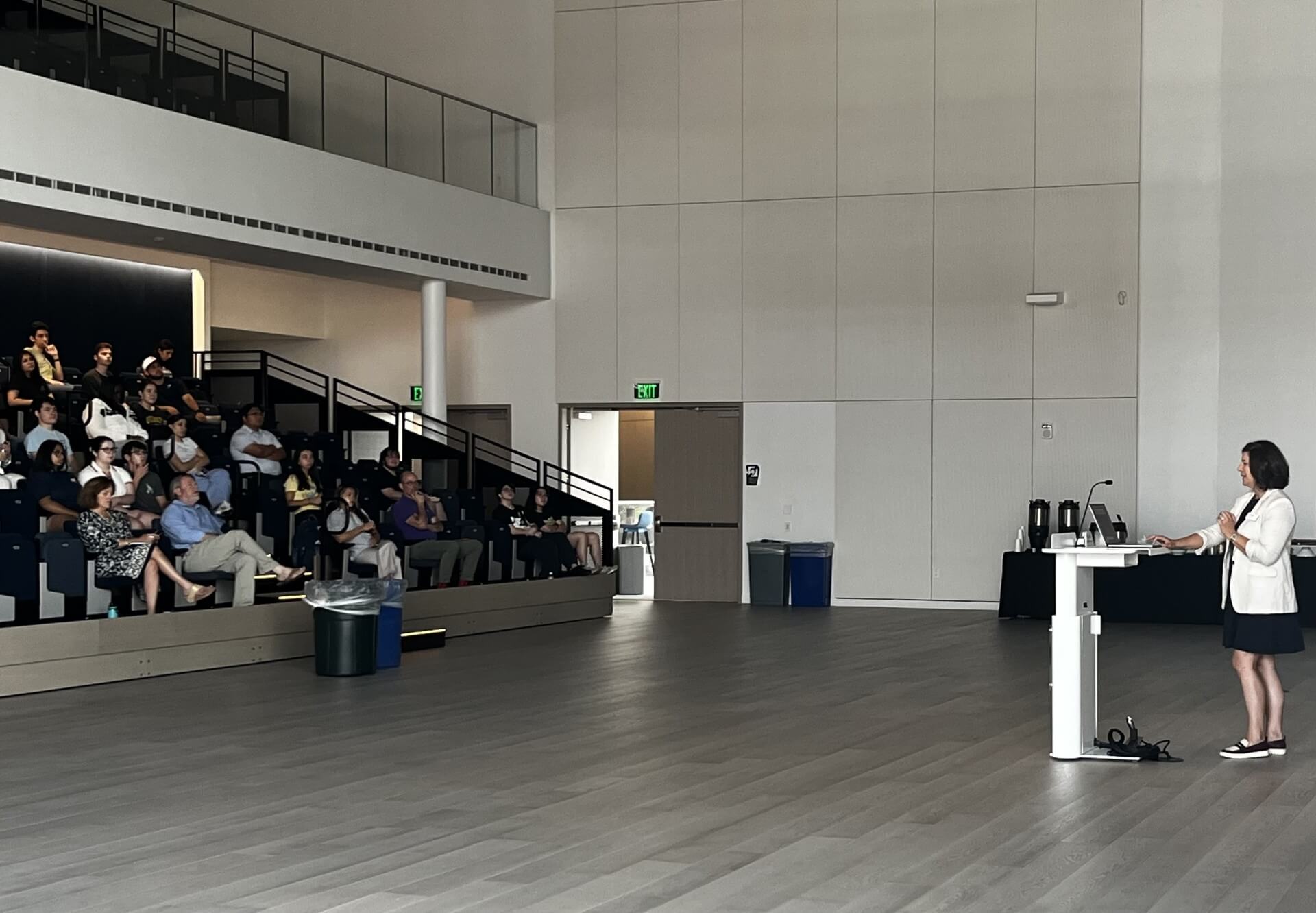
‘Listen, Meet, Mingle’ inspires Bobcats to engage in faculty-mentored research
September 22, 2025

September 22, 2025

Held recently at The SITE on the Mount Carmel Campus South Quad, the program featured talks by faculty researchers from Quinnipiac Frank H. Netter MD School of Medicine, School of Health Sciences, and College of Arts and Sciences as well as outside experts.
The line-up of a dozen brief presentations helped undergraduate and graduate students meet with researchers who shared project overviews and discussed invaluable skills gained through mentored research.
School of Health Sciences Dean Trent Honda said research involving faculty-student engagement creates dual benefits.
“Today’s event not only fosters meaningful interdisciplinary collaborations among faculty, but collaborating on these projects will also provide our students with the technical expertise and critical thinking skills needed to push the boundaries of biomedical and health sciences research with real-world impact,” Honda said.
In addition to his leadership role, Honda serves as a professor of biomedical sciences and physician assistant studies. Honda offered students the opportunity to get involved with his lab’s environmental and epidemiology research on air quality and health.
In addition to faculty, research options with outside experts were shared by Connecticut Agricultural Experiment Station Plant Pathology and Ecology Chief Scientist Lindsey Triplett, and Boehringer-Ingelheim Scientist IV, Immunology and Respiratory Researcher Angela McNabola. Hartford HealthCare (HHC) Research Operations Manager Emily Shearier discussed HHC's unique mentorship model which pairs undergraduate students directly with practicing clinicians for hands-on research experience.
Students were invited to work with expert Quinnipiac faculty who have mentored research students at the undergraduate and master's level in their research and labs, such as Alexandre de Lencastre, professor of biology, Molecular and Cell Biology Masters Program Director, and co-chair of QUIP-RS (Quinnipiac University Interdisciplinary Program for Research and Scholarship). His lab uses the model organism C. elegans, a roundworm, to study aging and neurodegeneration.
College of Arts and Sciences Dean Adam Roth said this event helps to showcase the impressive breadth of science faculty research and scholarship at Quinnipiac, while also raising awareness of the exceptional opportunities students have to study under the tutelage of faculty members.
“I think we don’t do enough to put on display all of the amazing research projects our faculty are engaged in, and often that students have an opportunity to work on as well, either in the lab of the faculty member or through our QUIP-RS program,” said Roth.
Additional faculty experts presenting fascinating research opportunities during “Listen, Meet, Mingle” were Shawna Reed, assistant professor of biomedical sciences; Trevor Tivey, assistant professor of biology; Sanoji Samarakkody, assistant professor of biomedical sciences; Craig Magie, associate professor of biology; Nicole Bracci, assistant professor of biomedical sciences; Kelly Crusio, associate professor of medical sciences; and Adrienne Betz, professor of psychology.
Event organizer and professor of biomedical sciences Martine Mirrione directed students to a program resource link sharing each presenter’s biography and research focus, together with those of many other science faculty researchers eager to take on student mentees. The event was part of an ongoing initiative.
Mirrione welcomes student participation in her lab, where she is examining the neurobiological effects of stress, and potential therapeutics for depression, using pre-clinical rodent models.
“I think a lot of students are hesitant to reach out, because they don’t know how; so what we’re trying to do is create a list of faculty that are interested in doing research with students,” Mirrione. “This event is giving students an opportunity to come listen, meet the faculty face-to-face, ask a question, and maybe feel a little more confident to approach them.”
During last year’s event, biomedical sciences master’s candidate Natalie Grober, MHS ‘26, connected with associate professor of medical sciences Carter Takacs and assistant professor of biomedical sciences Paul Wolujewicz. Through Independent Study, followed by Thesis I, Grober has been involved with working on their potential project.
Research in the Wolujewicz Lab entails interrogating whole genome sequencing and other large scale data sets to advance understanding of rare and complex genetic disorders. One focus in the lab is studying the genetic underpinnings of neural tube defects. Takacs’ lab is interested in genetic regulatory mechanisms that drive the earliest stages of animal embryonic development, with particular interest in brain morphogenesis, using zebrafish as a model. The lab couples CRISPR-based genome editing with biochemical techniques and microscopy.
“CRISPR/Cas was something I remember learning about while in high school, and so it was very exciting to think of the prospect of my own RNA knockdown project within zebrafish to investigate neural tube defects using the CRISPR/Cas system,” Grober said. “The Independent study, and now Thesis I, have been some of the most informative education experiences I have had.”
Grober said becoming engaged in research mentorship as a student has been profoundly helpful in guiding her knowledge in the field of biomedical science and medical research.
“It is very encouraging to have such supportive mentors guiding each step of the process and makes me feel confident I am adding to the world of research science. I'll have a completed project under my belt going into my future endeavors to become a psychiatrist, and I definitely have my research mentorship to thank for that,” said Grober.
At the event, Honda said it was inspiring to witness the impactful research faculty is leading as they tackle complex challenges with innovative, cutting-edge approaches.
“Watching our faculty and students engage with one another, I felt as though I was witnessing the origin story of the next generation of leaders in biomedical research,” Honda said.
Quinnipiac Today is your source for what's happening throughout #BobcatNation. Sign up for our weekly email newsletter to be among the first to know about news, events and members of our Bobcat family who are making a positive difference in our world.
Sign Up Now